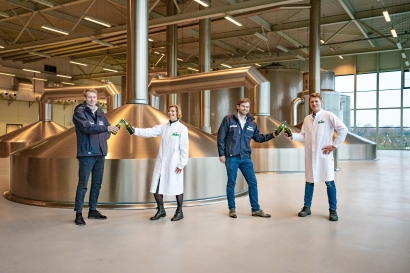
A regional cooperation for a greener beer brewing process and a greener regional gas network. This sustainable alternative for fossil natural gas will supply gas which is equivalent to the gas needs of approximately 700 households.
Biogas to biomethane
By the end of this year, more than two-thirds of Grolsch's heat demand will be met by sustainable heat from waste management company Twence, delivered through a new underground pipeline. With this heat supply, not all of Grolsch's biogas can be used directly for its own heat demand anymore. Therefore, the biogas produced will be upgraded to biomethane in the newly built biogas upgrader on the brewery's site.
"With the arrival of the heat pipeline, it is necessary to give the biogas another use, in which it is still optimally utilized: biomethane is a sustainable, proven efficient application. We are very proud of this step as part of our energy transition, in combination with the projects of our sustainable heat purchase and 100% green electricity choice. All of these initiatives bring us a big step closer to our goal of being a carbon neutral brewery by 2025!" said Susan Ladrak, Sustainability Manager at Grolsch.
“In fact, by taking these steps, we are reducing our CO2 emissions within scope 1 and 2 combined by more than 85%." Preparations for the new plant are in full swing. It is expected that the biomethane can be delivered to the gas grid from the third quarter of 2022.
Regional collaboration
Developing and building biomethane systems contributes to the energy transition of which HoSt is a driving force. In this regional collaboration, Grolsch delivers the biogas to HoSt and HoSt supplies the technology which will remain under HoSt's ownership and management.
“More than half of the biomethane systems in the Netherlands are built by HoSt and energy-as-a-service collaborations like this are becoming more common. This sustainable gas variant plays a key role in the energy transition and through our technologies we are able to provide answers to both the energy and waste issue. Biomethane is highly suitable for the existing gas grid and for taking sustainability steps in existing buildings and in industry. The government strongly stimulates the production of biomethane and there is a great need for alternatives to fossil fuels", says Managing Director Jelle Klein Teeselink of the HoSt Group.
“Part of the Dutch government's plans include mandatory blending targets for gas suppliers to add renewable gas to their supply, but we also see a strong increase in demand internationally on all continents. We are very proud of this collaboration close to home. The Netherlands is not a leader in getting energy from renewable sources, however the country has high ambitions. Every initiative is a step closer."
Biogas upgrading
Biomethane production from biogas is done by means of membrane technology. In a few efficient steps, the membranes separate the methane from the CO2 and other components. The methane content of the biogas is brought to the desired level, after which biomethane is the end-result. A sustainable gas with the same properties as natural gas. On site, the biomethane, including the well-known gas smell (THT), is delivered to the existing (natural) gas network. The gas that is produced has a methane content of 89%.

